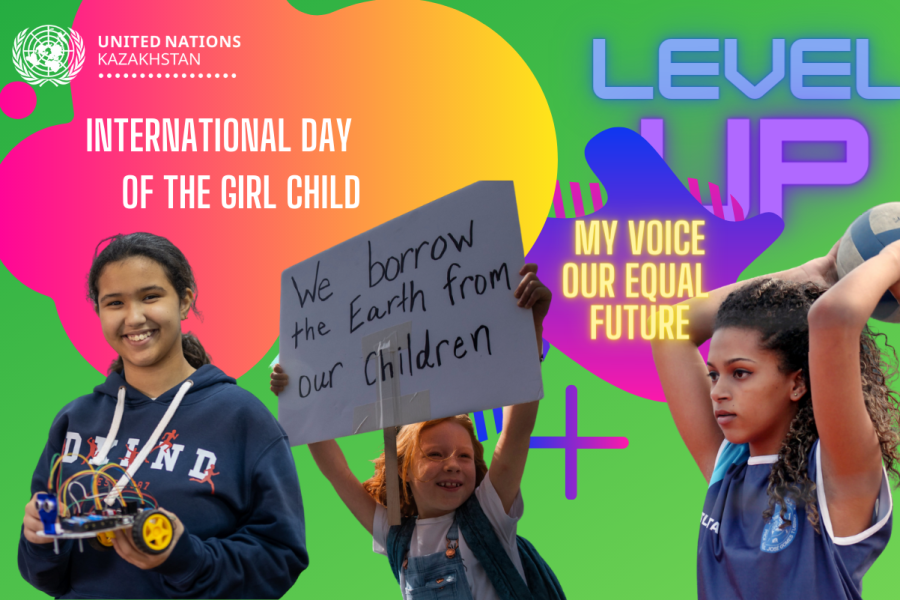Joint Statement by United Nations agencies in Kazakhstan on the occasion of the International Day of the Girl Child
09 қазан 2020
NUR-SULTAN – Annually on 11 October, the International Day of the Girl Child, we celebrate girls in Kazakhstan and everywhere as they are the source of inspiration, energy, and creativity for all of us.

If empowered, they can help build a better future and bring transformative changes. Today girl-led movements are tackling issues like climate change, racial injustice, skills and learning inequality, bring innovations into aerospace engineering and launch nanosatellites into space. This year, while we face the global COVID-19 crisis, we seize the opportunity to join forces and reimagine a better world inspired by girls under the theme “My voice, our equal future." The world where girls feel more empowered and recognized, supported, and invested in.
On 19 December 2011, United Nations General Assembly adopted Resolution 66/170 to declare 11 October as the International Day of the Girl Child to recognize girls’ rights, highlight the unique challenges they face all over the world and also advocate for the attainment of their basic human rights, like education and bodily autonomy.
25 years ago, at the fourth World Conference on Women in Beijing, the world community adopted the most visionary blueprint for the empowerment of women and girls, the Beijing Declaration and Platform for Action, so today girls can follow the plan and take the actions to build their peaceful and prosperous future. To commemorate the Beijing Declaration UN Women is bringing together the generations of women and girls’ rights defenders into the multigenerational campaign: “Generation Equality”. Clear objectives and actions related to the needs and opportunities of adolescent girls and their solutions are central to the Generation Equality mission.
Girls demand a life free of violence within and outside the home and we have to ensure that. According to the 2015 Kazakhstan Multiple Indicator Cluster Survey, 50% of girls are subjected to violent forms of discipline in the family. Including 21% are subjected to physical violence, 45% are subjected to psychological aggression.
Moreover, COVID-19 has created a new obstacle for girls to equal access to information and education – digital divide. Girls face immense gaps to attain the education and skills they need to compete in a rapidly changing workforce. Gender roles and stereotypes are learned behaviours that start early in life, solidify during adolescence, and influence the kinds of jobs undertaken. Globally, the percentage of females among Science, Technology, Engineering and Math (STEM) graduates is below 15% in over two-thirds of countries. To achieve gender equality, girls and young women need equal access to education, technology, digital training and to be safe online.
Empowerment of girls with new skills plays a crucial role in economic development. Aiming to promote STEM education and innovations among girls in Kazakhstan, in 2020 UNICEF and the Science and Technology Park of Al-Farabi Kazakh National University launched an educational project for girls on the development of UniSat nanosatellites. This October 20 girls aged 14 to 35 years from different regions of Kazakhstan will launch the first ready nanosatellite to the stratosphere. This launch proves that the field of nanotechnology, programming and design of spacecraft is open for girls in Kazakhstan. In Kazakhstan girls also represent the majority of UN volunteers, who helped youth to overcome the lockdown, provided emotional health support, promoted stress resistance and shared their skills with their peers.
Empowering girls through cultural and creative industries is at the heart of the 2005 UNESCO Convention on the Protection and Promotion of the diversity of cultural expressions. In this regard UNESCO is launching the #GirlsCreArt2020 online course, dedicated to girls with special needs from all Central Asian countries, with the aim of expanding their opportunities and improving knowledge in certain creative professional sectors.
Today UNFPA is also re-launching “Her Future” project together with singer and activist Kaliya and The Steppe, which aims at raising awareness on gender issues and reproductive health and rights of every girl and woman. This project was created as another effort towards a gender-equal world, one where every girl has the power to make informed choices about her health and her life.
Achievement of gender equality, women and girls’ empowerment is integral for each of 17 Sustainable Development Goals. Through ensuring the rights of women and girls across all the goals we will get to justice and inclusion, economies that work for all, and sustain our shared environment now and for future generations.

